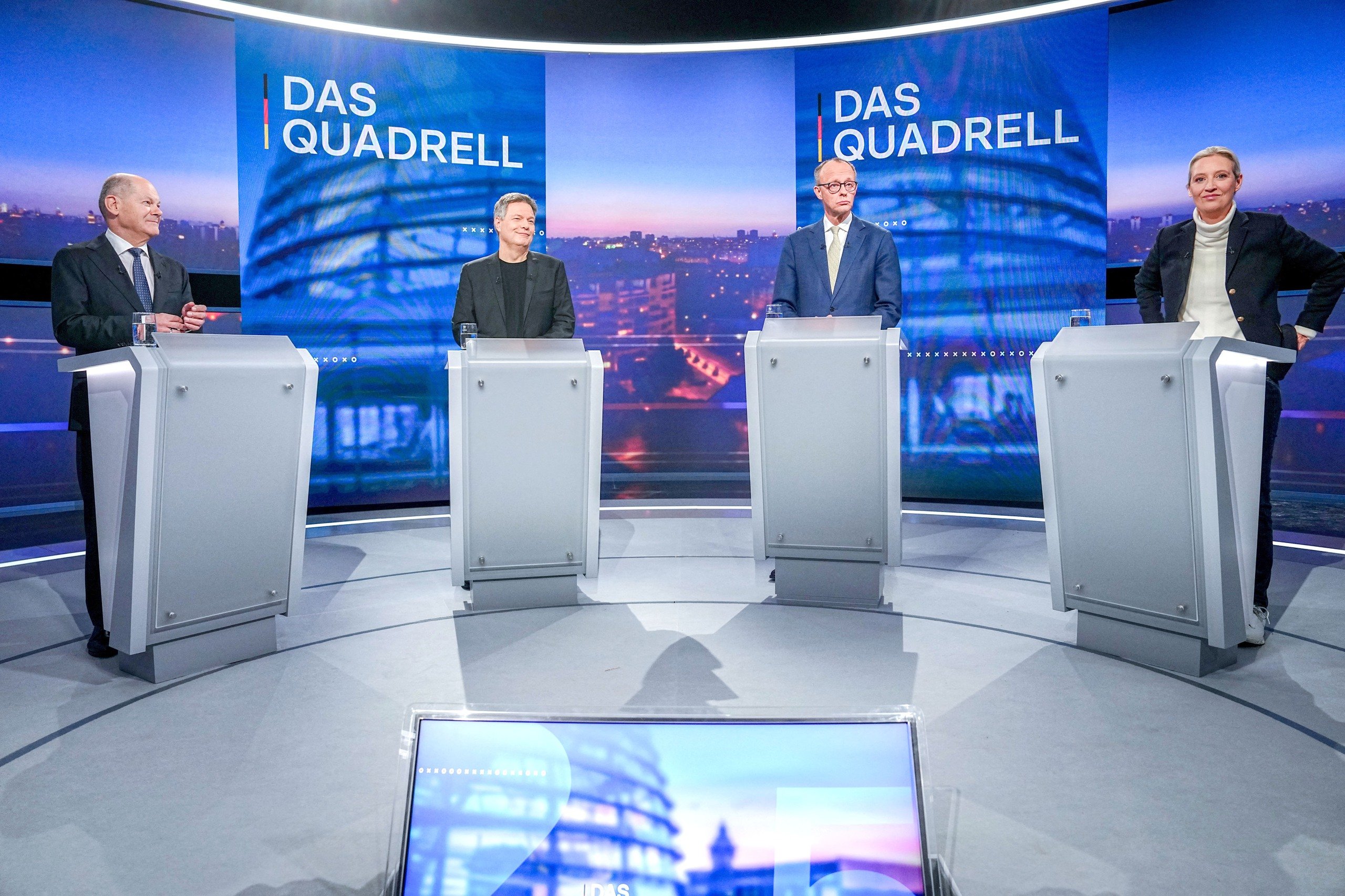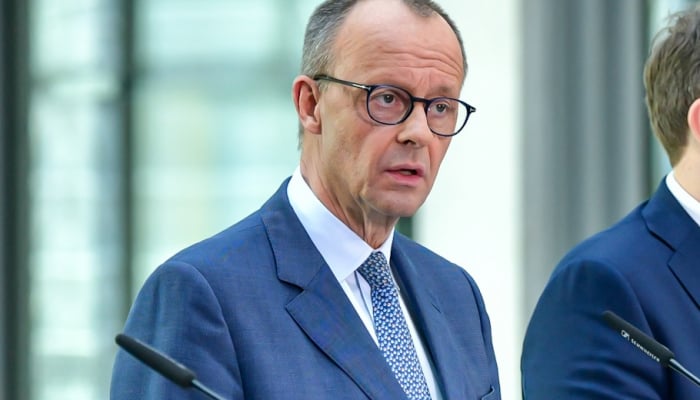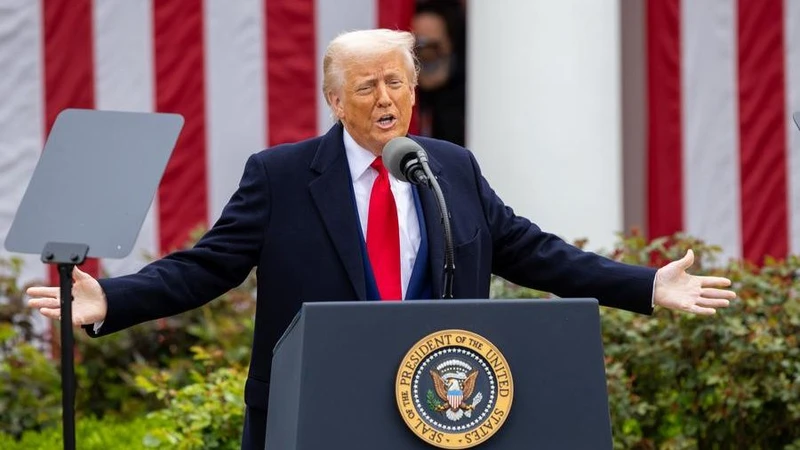Germany's conservative CDU/CSU party is leading, but finding a coalition to form a government will be a challenge.
German voters will go to the polls on February 23 to elect a new parliament. This election will almost certainly bring about a change in the country's leadership, with the conservative CDU/CSU (Christian Democratic Union/Socialist Union) led by Friedrich Merz creating a large gap.
Conservatives hold the advantage
Polls over the past several months have shown similar results for the four major parties. A YouGov survey on February 17 showed the CDU/CSU maintaining its lead with 27% of supporters, far ahead of the far-right Alternative for Germany (AfD) party of Alice Weidel, which received 20%. The Social Democratic Party (SPD) of current German Chancellor Olaf Scholz and the Green Party of Robert Habeck followed with 17% and 12%, respectively.

4 candidates debated on February 16: (From left to right) Mr. Scholz (SPD), Mr. Habeck (Green Party), Mr. Merz (CDU/CSU) and Ms. Weidel (AfD)
Despite its lead, Mr Merz’s coalition will need to keep an eye on how many seats it wins out of the 630 seats up for grabs. The more seats the CDU/CSU wins, the less likely it is that it will need to form a coalition with multiple parties to form a majority in parliament.
"I want to make sure strategically that we have at least two options, and only one, which could be the SPD or the Greens," Merz said during the German chancellor candidate debate on February 16, according to Politico. He also ruled out a coalition with the far-right AfD. If Merz were forced to cooperate with more than one party, he could have trouble running a government, given the possibility of different views among the parties.
The national polls also show a clear rise of the far right, with the AfD expected to come in second with 22% support, more than double the 2021 election result. At the bottom, the smaller parties, including the Free Democratic Party (FDP), the Left Party and the BSW, will have to work hard to get 5% of the vote, the necessary condition to enter the German parliament. The election results of the smaller parties can also affect the overall picture, if they win enough seats to form a coalition with the leading party to form a majority government.
Important issues
Economy and immigration are two major issues that parties have highlighted in order to attract support. According to Reuters, Germany, Europe's largest economy, recorded a second consecutive year of recession last year. High energy prices have had a major impact on the economic situation and the lives of households and businesses in Germany. Of the four leading parties in the race, the CDU/CSU, SPD and the Greens agree to expand renewable energy to reduce costs, but differ on their spending stance. The CDU and AfD have proposed to reconsider the use of nuclear energy, an idea that the other two major parties oppose. Meanwhile, the AfD disagrees with subsidies for renewable energy projects.
The immigration situation has heated up recently with serious attacks in Germany involving foreign suspects. This has increased public concerns about security and parties have also taken a stance on immigration. On this issue, the AfD has taken a hard line, calling for closing the borders and eliminating refugee quotas. Some senior members of the AfD also want to deport millions of people of foreign origin, including those who have German citizenship.
Meanwhile, Friedrich Merz’s decision to put two anti-immigration bills backed by the AfD to the floor has sparked outrage. Critics say he has broken a taboo by breaking the “firewall” – a post-World War II political stance that states that German political parties will not openly support or cooperate with far-right parties. The SPD also wants tighter border controls, combined with the recruitment of skilled foreign workers. On the other hand, the Greens have advocated an open asylum policy and greater integration.
How does the German parliamentary election take place?
Some 59 million Germans aged 18 and over are eligible to vote on February 23. Each person will have two votes. The first vote will be for candidates in 299 constituencies, the other for political parties. The remaining parliamentary seats will be divided among the parties according to the proportion of the second vote.
A party needs to receive at least 5% of the vote to enter the German parliament. If it does not, it can still get seats in parliament if at least three of its candidates win in 299 constituencies. This year is also the fourth time Germany has held early elections since World War II.
Source: https://thanhnien.vn/bau-cu-duc-den-giai-doan-nuoc-rut-185250219222227765.htm


![[Photo] April Festival in Can Tho City](https://vstatic.vietnam.vn/vietnam/resource/IMAGE/2025/4/10/bf5ae82870e648fabfbcc93a25b481ea)


![[Photo] Unique folk games at Chuong Village Festival](https://vstatic.vietnam.vn/vietnam/resource/IMAGE/2025/4/10/cff805a06fdd443b9474c017f98075a4)
![[Photo] Opening of the 11th Conference of the 13th Party Central Committee](https://vstatic.vietnam.vn/vietnam/resource/IMAGE/2025/4/10/f9e717b67de343d7b687cb419c0829a2)
























































































Comment (0)